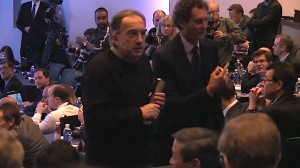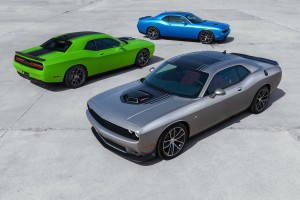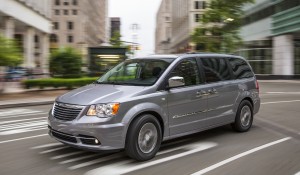
FCA CEO Sergio Marchionne told reporters and analysts at today's day-long meeting that he will be staying through 2018: two years long than expected.
The newly merged Fiat Chrysler Automobiles expects to achieve significantly better growth than the rest of the auto industry, company officials said Tuesday as they laid out the carmaker’s five-year global strategy.
The Euro-American company expects to see global sales surge from the 4.4 million vehicles it sold in 2013 to somewhere on the order of 7 million by 2018, said Chief Financial Officer Richard Palmer, while significantly boosting margins and earnings.
To keep the company on track, “I am going to stay,” CEO Sergio Marchionne confirmed, “to make sure the plan gets finished.” The Canadian-educated executive had previously only committed to remaining with Fiat Chrysler through 2016.

The Dodge brand is going to be refocused on performance products like the 2015 Dodge Challenger SXT, 2015 Dodge Challenger R/T Shaker, 2015 Dodge Challenger 392 HEMI Scat Pack Shaker
Putting a framework around a day-long strategy session, during which FCA officials outlined everything from product to production plans, Palmer noted that the Jeep brand is expected to deliver the bulk of the automaker’s growth as it launches new models like the Renegade, and expands its presence in emerging markets such as China.
But despite Fiat Chrysler’s focus on the booming Asia Pacific market, India and other emerging economies, company officials stressed that North America will continue to provide the largest growth – at least on a numeric basis – as well as the automaker’s best profit margins.
Going into the briefing there were many questions being asked about Chrysler’s long-term potential, but senior executives attempted to put a positive spin on both their recent achievements and their future opportunities.
Reid Bigland, who wears numerous hats, including that of U.S. sales chief and CEO of Chrysler Canada, pointedly stressed that the Chrysler side of FCA significantly outperformed the promises it made during a similar strategy session in 2009 – boosting sales 82%, rather than the 75% it had forecast through 2014.
“Vision without execution is hallucination,” Bigland said, pointing to the maker’s confidence looking forward.
The first half of the Tuesday event focused on each of FCA’s eight brands. CEO Sergio Marchionne stressed that “brands are precious things” that must be nurtured and refined if the maker can meet its goals, which include significant improvements in both sales, margins and profits. Among other things:
- The Chrysler brand will re-focus on mainstream segments, backed by a number of new products including the 100 compact sedan, a new version of the Town & Country minivan;
- The Dodge brand will downsize its product line-up – dropping the familiar Grand Caravan minivan, for example — to better focus on performance models;
- The Fiat brand will pull back from the low- to no-margin European mainstream and emphasize higher-profit specialty vehicles like the 500 and the upcoming 500X crossover.
But Jeep will anchor the global push. From the record 731,565 vehicles sold in 2013 it is expected to climb to more than 1 million this year – and 1.9 million by 2018.

In 2016, the Chrysler Town & Country will be available with an optional plug-in hybrid powertrain expected to yield about 75 miles per gallon.
(FCA reports 12% increase in Q1 revenue. For more, Click Here.)
China will clearly be critical to Jeep, which recently announced plans to launch production there. So will Latin America – where FCA is readying a major new plant in Brazil – and India, soon expected to be the world’s third-largest auto market. But North America, the U.S. in particular, will remain Fiat Chrysler’s biggest market, and its most profitable, if the strategy the maker outlined proves accurate.
“By 2018, the group will be nearly debt free, with margins improving to a level nearly as good as our best competitor,” promised Marchionne.
(Click Here for more about FCA’s recent growth compared to the competition.)
The maker forecast its net income would jump from a modest 900 million Euros for 2013 to 5 billion Euros in 2018, or a predicated 4 Euros per share. Margins, meanwhile, would climb by as much as three percentage points, to somewhere between 6.6% and 7.4%.
In wrapping up his session, Marchionne stressed that the company’s new strategy should help it surpass the minimum 6 million vehicle minimum he believes it needs to be competitive in an industry increasingly dominated by giants. In fact, the seventh-ranked Chrysler now has “the potential of moving one step higher in that ranking” if it can hit its targets.
(To see more about what’s going on at Fiat Chrysler, Click Here.)
After more than nine hours of the deep dive about the company’s road map to the future, which concluded with a Q&A session with Marchionne, the nearly 400 industry analysts and journalists in attendance were still left with one simple question: can FCA pull it off?
“People have an enormous ability to underestimate the importance of leadership,” Marchionne said, pointing to his management team. The plan is in “execution mode” and will succeed, he stressed, adding that even if only “80% of the plan is delivered, you’re still miles ahead.”
Clearly, Marchionne sees his role as critical in that management team. “It’s not my first turnaround,” said Marchionne, concluding, “It will be my last.”
